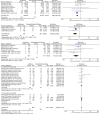Antibiotic treatment to prevent pediatric acute otitis media infectious complications: A meta-analysis
- PMID: 38885271
- PMCID: PMC11182555
- DOI: 10.1371/journal.pone.0304742
Antibiotic treatment to prevent pediatric acute otitis media infectious complications: A meta-analysis
Abstract
Background: Most US children with acute otitis media [AOM] receive prompt antibiotic treatment, though guidelines encourage watchful waiting. Previous systematic reviews of antibiotics versus watchful waiting have focused on symptom resolution and RCTs, limiting the assessment of serious, rare complications. We sought to evaluate these complications by including observational studies.
Methods: RCTs and observational studies that compared antibiotics to placebo or watchful waiting for pediatric clinician diagnosed AOM were identified [PubMed/MEDLINE, Embase, Cochrane Database of Systematic Reviews, Central Register of Controlled Trials, and Web of Science] and reviewed for meta-analysis. Two reviewers independently extracted study characteristics, patient characteristics, and outcomes. We assessed publication bias, study bias with ROBINS-1 and RoB-2 and used random-effects models to assess treatment effects.
Results: 24 studies were included. Antibiotics decreased the risk of acute mastoiditis [incidence 0.02%, RR 0.48, 95% CI 0.40-0.59; NNT 5,368]. This protective effect may be underestimated because of misclassification of non-suppurative conditions as AOM. Intracranial complications remained too rare to assess. Antibiotics markedly increased the risk of adverse effects [incidence 10.5%, RR 1.49, 1.27-1.73; NNH 23]. Studies used non-specific criteria for acute mastoiditis, potentially underestimating treatment effects.
Conclusions: Prompt antibiotic therapy reduces the risk for some AOM complications. The NNT to prevent serious, rare complications is high, while the NNH is relatively low. Large-scale population-based observational studies using real-world datasets with validated measures of severe complications are needed to improve understanding of risk factors for serious AOM complications, facilitate more selective antibiotic therapy, and optimize individual outcomes and public health.
Copyright: © 2024 Smolinski et al. This is an open access article distributed under the terms of the Creative Commons Attribution License, which permits unrestricted use, distribution, and reproduction in any medium, provided the original author and source are credited.
Conflict of interest statement
The following authors have conflicts of interest to disclose. NES owns stock through inheritance in Baxter, CVS Health, Edwards Lifesciences, and Takeda. PJA has received research funding from Next Science, consulting fees from Janssen and Akouos, and discloses authorship with UpToDate. I have received research funding from Merck, Sharpe and Dohme, NIH, AHRQ, PCORI, FDA, the Bill and Melinda Gates Foundation and the state of Florida and received consulting fees from Arbor Pharmaceuticals and Genentech Inc, none of which is related to this work. Other authors have no conflicts of interest to disclose. This does not alter our adherence to PLOS ONE policies on sharing data and materials.
Figures



References
-
- Diagnosis and management of acute otitis media. Pediatrics. 2004;113[5]. - PubMed
Publication types
MeSH terms
Substances
LinkOut - more resources
Full Text Sources
Medical

